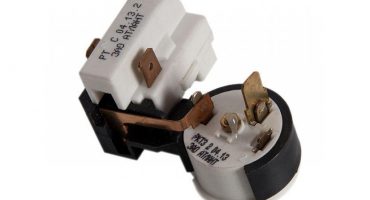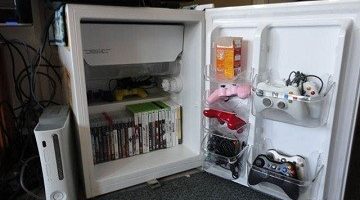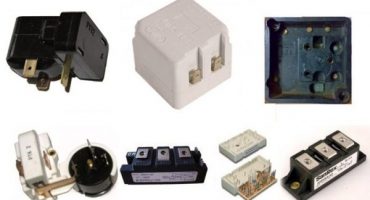It is difficult to imagine home life without such a useful and necessary device as a refrigerator. A slight downtime, even for a few hours, can lead to spoilage of products. That is why people often listen to the work of the equipment, check its condition, and with the slightest malfunction try to identify the cause and try to prevent a more complex breakdown. Today we will talk about such a common problem as the refrigerator heats up. Is this the norm? In what cases can we talk about a malfunction and what to do first? To begin with, you should not panic, you need to decide what exactly is heated in the refrigerator, in which part of it. Much depends on this.
Why does the refrigerator have hot side walls
The long-awaited summer has come - the time for vacations and vacations. But the joyful mood was accidentally spoiled: inadvertently touching the refrigerator case from the outside, it was noticed that it was hot. Do not panic and put off all things for later, taking care of calling the master at home. If the technique works, and the walls get warm at the same time, then everything is ok. It should be so. But if the case is hot even while the refrigerator is resting, it is worth considering, is everything all right with the irreplaceable assistant?
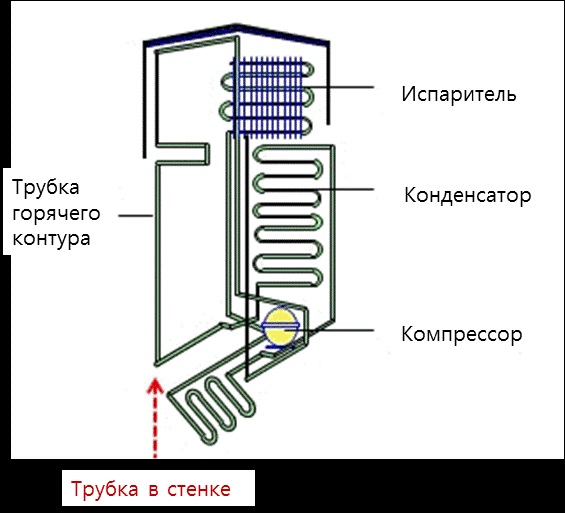
Refrigeration circuit
So, first of all, to understand the features of the operation and operation of equipment, it will not be superfluous to re-read the instructions. Manufacturers describe everything in great detail there.
In some models of the refrigerator, a special grill is located on the rear wall. It is called a capacitor. It is heated when the engine is running, and then it cools down. In some modern models, you may find that there is no such lattice. It is hidden in the inner walls of the refrigerator. Here is the answer to the question why the side walls are hot.
The grille is not only hidden in order to improve the appearance. Such a constructive innovation is justified in terms of efficiency and durability. Everyone knows that the freezer has a low freezing temperature. In this case, cold air can usually escape at the door contact area (especially if there is damage to the sealing rubber).
If it is hot outside and the rooms are very hot, condensation will form on the walls. Over time, this leads to the formation of fungus and mold on the seal, as well as to rusting of the housing. In this case, the condenser tubes, which are located on the sides, make it possible to evaporate moisture.
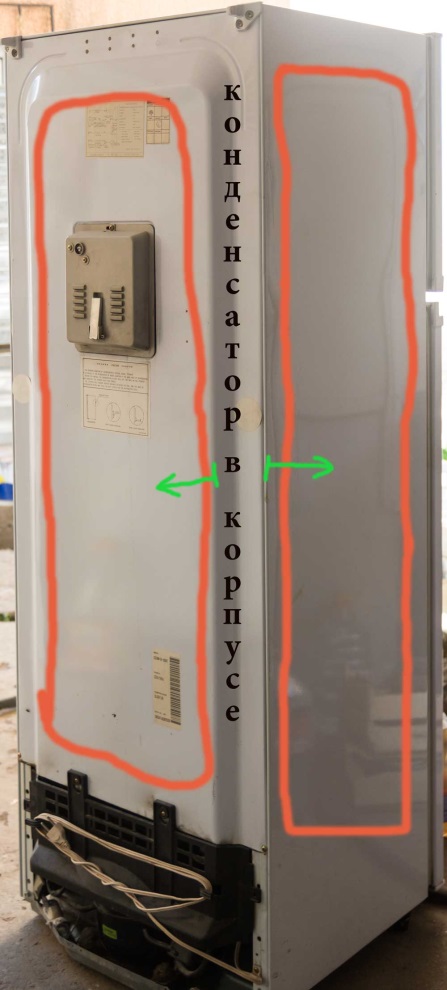
In modern refrigerators, condensers can be located inside
Why the refrigerator is very hot:
- The technique is pushed close to the wall. According to the norms, there should be a distance of at least 7 cm between the wall and the furniture and the refrigerator body.
- The room is too hot.
- The freezer seal is heated, so the door fits snugly, and, accordingly, the cold does not go anywhere.
- Some devices heat the jumper between two cameras. This is normal.
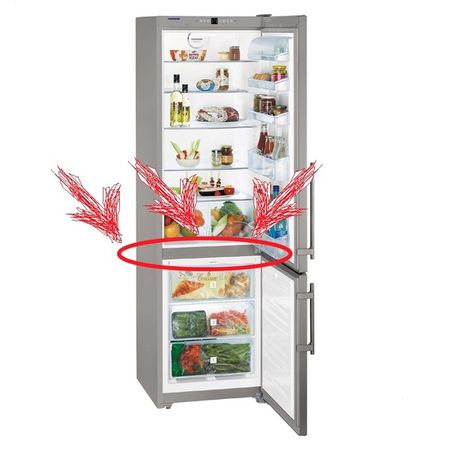
Partition heating between the refrigerator and the freezer is normal
Why the fridge (grill) is heating up behind. In what cases can not do without a master?
The back wall is always heated, which is due to the principle of operation of the refrigerator. But if the grill is not just hot, but red-hot (t above 45 ° C), this is a cause for concern.
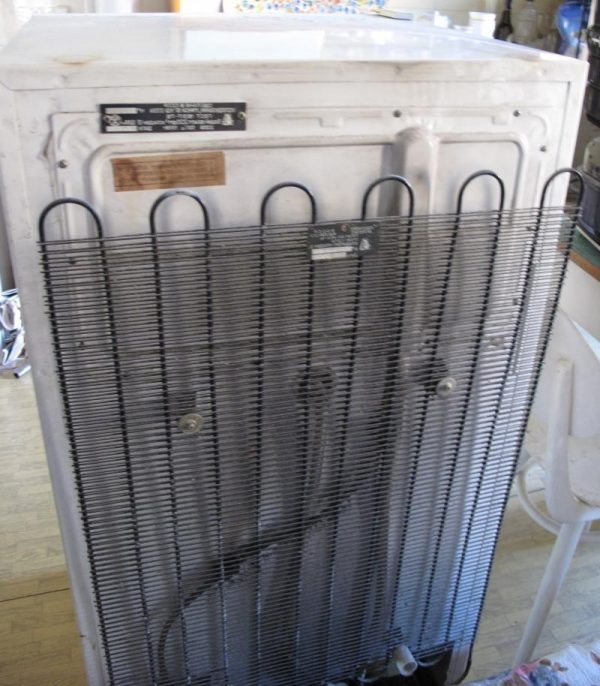
Refrigerator condenser
Check the grill for contamination.Dust, fumes prevent heat transfer, which, in turn, reduces the efficiency of the refrigerator. It should be cleaned. To do this, disconnect the device from the network, move the equipment away from the wall and vacuum the grate or remove the coating with a brush. In this case, care must be taken not to damage the fragile tubes of the capacitor.
If this does not help, check the condition of the temperature sensor. Perhaps it is set to the maximum position, which led to increased load. As a result of increased heat transfer, the lattice temperature naturally became higher.
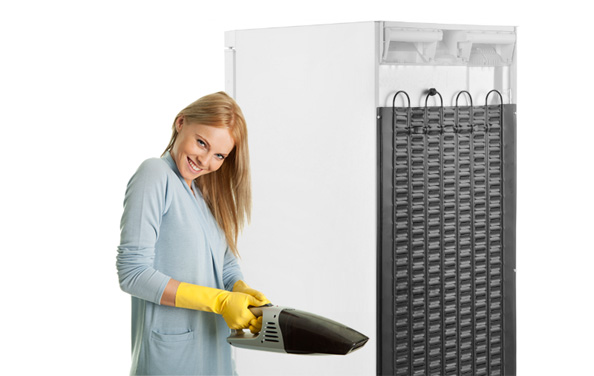
Clean the rear grill of the refrigerator
Do not neglect the ambient temperature. In hot summers at t 30 ° C and above, heat exchange is difficult, which creates a large load on the compressor.
If all the above situations did not help to fix the problem, you need to call the wizard for a complete diagnosis.
The refrigerator warms, not freezes
The engine heats up in serviceable and faulty refrigerators. You can not beat the alarm until the cameras maintain the desired temperature. If the products disappear, or, on the contrary, are frozen, or squeak sensors, alarm indicators are triggered - you should pay attention and listen to the work of the refrigerator.
If the motor heats up, but does not freeze, there may be several reasons:
- freon leak;
- clogged capillary system or filter drier;
- temperature sensor breakdown;
- violation of the thermal return from the walls in rooms with high values of humidity and temperature.
If gas bleeding starts in the circuit, the compressor runs without interruption, constantly compressing the air. Naturally, in this situation, the answer to the question why the refrigerator compressor is very hot is obvious. At the same time, the motor is so hot that when you touch it you can get burned, it gives its heat to the room. The evaporator gets warm. Here is the answer to the question: why does the refrigerator not freeze, and with its work it is able to replace a full-fledged heating radiator. Of course, this is a joke. To use a refrigerator in such quality, at least, will be strange. If you need room heating, you can alternatively consider an option with an air conditioner operating in cooling and heating mode.
If the motor does not start, the reason is the compressor. Most likely, there was an interturn winding short circuit or short circuit. As a result, the engine heats up, but does not start. At the same time, clicks of the triggered start-up relay are heard. In fact, in this condition, the refrigerator does not work at all. A node replacement will be required, which, however, is associated with serious cash costs.
If blockage occurs in the capillary tube, the freezer will warm up. Sign of failure - only the first elbow of the capacitor grid is heated, and the rest of the unit is cold.
A malfunction of the electronics or a breakdown of the temperature sensor can stop the compressor from starting. In both cases, the node will not receive a command to start:
- a broken ECU does not give a control signal;
- a broken temperature sensor erroneously informs the computer that the temperature in the chambers is normal, respectively, the computer does not give a signal.
Causes that are not breakdowns, but lead to an increase in temperature in the chambers:
- Many products are loaded into the refrigerator at once.
- Pans with hot liquids are placed in the chambers.
- The refrigerator has not been defrosted for a long time.
- The refrigerator doors open too often.
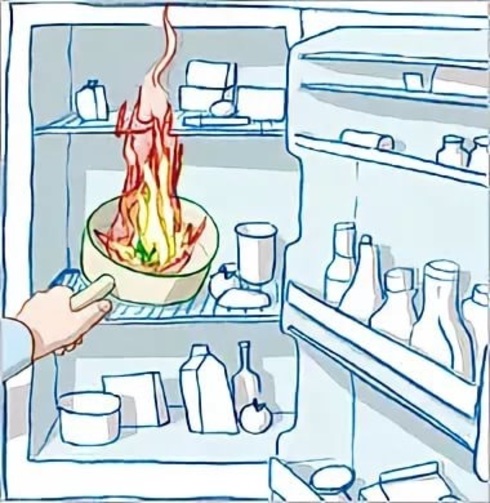
No need to refrigerate hot foods
Of course, everything that is listed above is not allowed to be done if the goal is to extend the life of the refrigerator.
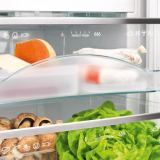 Pros and Cons of Nou Frost Refrigerators
Pros and Cons of Nou Frost Refrigerators  Refrigerator next to the stove and oven - can I?
Refrigerator next to the stove and oven - can I?  Is it possible to hang fridge magnets
Is it possible to hang fridge magnets  How to choose a good two-chamber refrigerator and features of its device
How to choose a good two-chamber refrigerator and features of its device 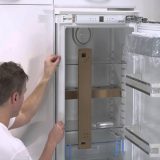 The water in the refrigerator does not go away and why the water does not freeze in the freezer - what to do
The water in the refrigerator does not go away and why the water does not freeze in the freezer - what to do 